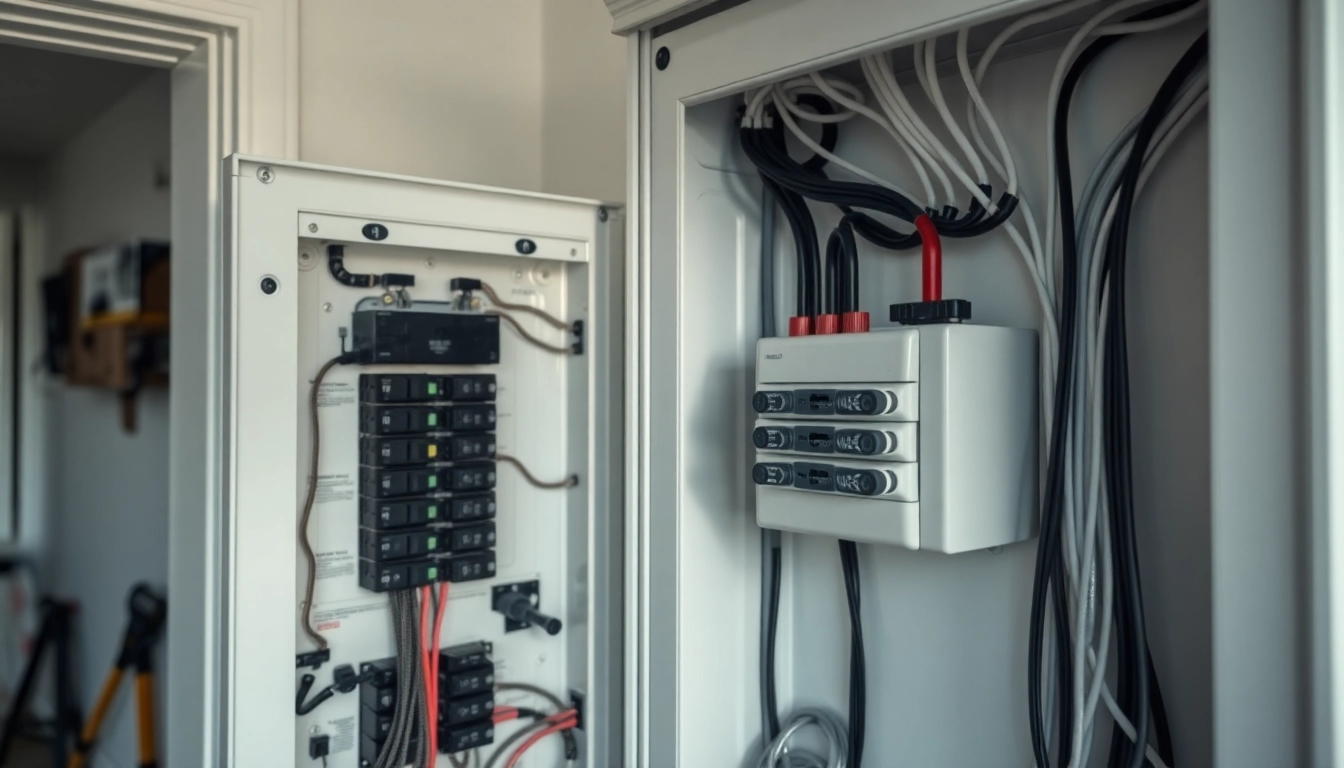Understanding Electrical Panels
What is an Electrical Panel?
An electrical panel, commonly referred to as a breaker box or distribution board, serves as the central hub of your home’s electrical system. It is responsible for monitoring and distributing electricity to various circuits throughout your home. All the power that flows from your utility company passes through this panel before being distributed to lighting, appliances, and outlets. Essentially, the electrical panel protects your circuits from overloads and short circuits by automatically shutting off power when necessary. For more insights on the Electrical Panel and its importance, it’s essential to grasp its basic operations and components.
Components of Electrical Panels
Electrical panels consist of several key components that work together to ensure the safe and efficient distribution of electrical power. These include:
- Main Breaker: The main breaker acts as a switch to turn off power to your entire electrical system. It is critical for ensuring safety during maintenance and servicing.
- Circuit Breakers: These devices interrupt the flow of electricity in the event of an overload or short circuit. They allow you to control power to individual circuits, providing a layer of safety and control over your electrical system.
- Neutral Bus Bar: The neutral bus is where the neutral wires from various circuits connect. It facilitates the return of current back to the electrical service.
- Ground Bus Bar: Ground wires from the electrical system connect to this bar to protect against electrical faults and ensure safety.
- Enclosure: The panel’s enclosure protects the internal components from external hazards and ensures the safety of the electrical system.
How Electrical Panels Function
When electricity enters your home, it first passes through the electrical panel. The main breaker then distributes this electricity among the various circuit breakers based on your home’s wiring system. Each circuit breaker controls an individual circuit, allowing for localized shut-offs and overload protection. In the event of a fault, such as an overload, the circuit breaker will trip, cutting off the flow of electricity and preventing potential hazards like fires or equipment damage. This efficiency makes electrical panels essential for modern homes, especially given the growing demand for power due to various household devices and appliances.
Signs You Need to Upgrade Your Electrical Panel
Frequent Circuit Breaker Trips
If you find yourself frequently resetting your circuit breakers due to overload, it’s a strong indicator that your electrical panel may no longer be adequate for your home. Frequent trips could signify that the panel is overwhelmed and may require an upgrade to handle the load. This is particularly true if you’ve added new appliances or electronic devices, increasing your overall electricity usage.
Unusual Noises from the Panel
Noises such as buzzing, crackling, or popping sounds coming from your electrical panel can be alarming. These sounds often suggest that components within the panel are faulty or that there is a serious electrical issue that needs to be addressed. Regular monitoring can help catch problematic noises early, preventing more severe issues down the line.
Increased Electricity Bills
An unexplained rise in your electricity bills may signal inefficiency within your electrical system. This might not only relate to increased usage but could indicate that your electrical panel is overloaded or malfunctioning. If the panel isn’t effectively managing the electricity flow, it may lead to higher costs. Conducting a thorough inspection can help resolve these discrepancies.
Benefits of Upgrading Your Electrical Panel
Improved Safety and Compliance
Upgrading your electrical panel can greatly enhance the safety of your home. Older panels may not meet current electrical codes or standards, putting your home at risk. A new panel ensures that your electrical system adheres to modern safety regulations, significantly reducing the risk of electrical fires, electrocution, and other hazards.
Enhanced Power Capacity
As your power needs grow, so too does the necessity for an electrical panel that can support that demand. Upgrading to a larger capacity panel allows you to power more devices without risking overloads. This becomes increasingly important in today’s tech-driven environment, where households often require significant power for various gadgets and appliances.
Increased Home Value
A modern electrical panel can add significant value to your home. Savvy homebuyers recognize the importance of updated electrical systems and are often willing to pay more for homes with newer installations. An upgraded panel not only provides practical benefits but can also act as a selling point when marketing your property.
Steps to Upgrade Your Electrical Panel
Assess Your Current Electrical System
The first step towards upgrading your electrical panel is assessing your current setup. Take stock of your home’s electrical needs and determine if your existing panel is sufficient. This involves checking the capacity of your panel (measured in amps) and ensuring it can support the devices you use. Additionally, consider the age and condition of your panel, as older models may not meet current safety standards.
Consult a Professional Electrician
Once you’ve identified issues with your electrical panel, it’s crucial to consult a licensed electrician. An experienced professional can provide insights into the suitability of your current panel and recommend the right replacement options. They can also help ensure that the installation process complies with local codes and regulations, crucial for your safety and insurance purposes.
Choosing the Right Electrical Panel
When selecting a new electrical panel, consider your home’s power requirements, the types of appliances you use, and future needs. Choose a panel from reputable manufacturers that offer enhanced features and warranties. Additionally, options with energy monitoring capabilities can provide valuable insights into your power consumption over time, helping to manage energy efficiency effectively.
Maintaining Your Electrical Panel
Regular Inspections and Cleanings
It’s essential to conduct regular inspections and maintenance on your electrical panel to ensure optimal performance. Dust and debris can accumulate over time, leading to overheating and potential hazards. Schedule annual inspections with a qualified electrician to address any issues proactively before they escalate.
Signs of Wear and Tear
Keep an eye out for signs of wear and tear, including discoloration on the panel or surrounding walls, burning smells, or damaged wiring. Early detection of these signs can prevent further damage and ensure the safety of your electrical system. Address issues promptly with the help of a professional.
When to Call for Repairs
In addition to regular maintenance, know when to call for immediate repairs. Any unusual occurrences — such as flickering lights, hot outlets, or tripped breakers — should be addressed immediately by a professional. Taking a proactive approach to repair needs can extend the lifespan of your electrical panel and enhance the overall safety of your electrical system.



